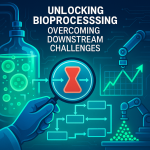🔬 Their innovative approach involves analyzing tRNA pools. This helps improve antibody production from cells under stress.
💡 With advanced techniques, Codomax aims to assist manufacturers at early development stages. They’re also developing adaptable cell lines for stress management in production.
Introduction:
The article discusses the innovative approaches taken by Codomax, a life-science startup, to address longstanding inefficiencies in the scale-up process of biomanufacturing, particularly in the production of difficult-to-express proteins like antibodies.
- Codomax utilizes cellular stress response mechanisms to enhance yields of hard-to-express proteins, thereby addressing inefficiencies in bioprocess scaling.
- The company plans to offer mass spectrometry and omics analyses focused on cellular stress pathways to assist biomanufacturers in identifying and resolving production bottlenecks.
- Manufacturers often abandon antibody candidates due to inadequate titers during commercial production, especially when transitioning to larger bioreactors, which can introduce new stressors.
- Codomax investigates the transfer RNA (tRNA) pool of cells, which reflects cellular stress responses, as a novel metric for strain engineering in biomanufacturing.
- The company has reported a threefold increase in monoclonal antibody production in CHO cell lines by modulating specific tRNA species through the application of their omics technology.
Conclusion:
Codomax’s approach promises to revolutionize how biomanufacturers manage production challenges by focusing on cellular responses to stress, potentially leading to higher yields of therapeutic proteins. By offering omics technology as a service and developing cell lines that can withstand production stresses, Codomax positions itself as a leader in improving biomanufacturing efficiency, which may have significant implications for the future of biotherapeutics.



